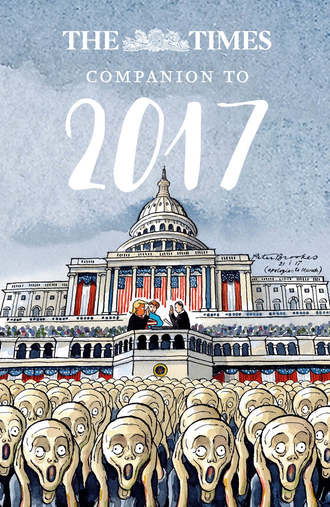
Полная версия
The Times Companion to 2017: The best writing from The Times


COPYRIGHT
Published by Times Books
An imprint of HarperCollins Publishers
Westerhill Road
Bishopbriggs
Glasgow G64 2QT
www.harpercollins.co.uk
times.books@harpercollins.co.uk
First edition 2017
© Times Newspapers Ltd 2017
www.thetimes.co.uk
The Times® is a registered trademark of Times Newspapers Ltd
All rights reserved under International and Pan-American Copyright Conventions. By payment of the required fees, you have been granted the non-exclusive, non-transferable right to access and read the text of this e-book on screen. No part of this text may be reproduced, transmitted, downloaded, decompiled, reverse engineered, or stored in or introduced into any information storage and retrieval system, in any form or by any means, whether electronic or mechanical, now known or hereafter invented, without the express written permission of HarperCollins.
The contents of this publication are believed correct at the time of printing. Nevertheless the publisher can accept no responsibility for errors or omissions, changes in the detail given or for any expense or loss thereby caused.
HarperCollins does not warrant that any website mentioned in this title will be provided uninterrupted, that any website will be error free, that defects will be corrected, or that the website or the server that makes it available are free of viruses or bugs. For full terms and conditions please refer to the site terms provided on the website.
eBook Edition: © October 2017
ISBN: 9780008262648
Version: 2017-10-12
CONTENTS
Cover
Title Page
Copyright
Introduction — Ian Brunskill
Acknowledgments
AUTUMN
Meritocracy is the last thing Britain needs — Philip Collins
Jeremy Paxman: ‘I’m not ashamed to say I’ve suffered depression’ — Interview by Janice Turner
Bataclan: one year on — Adam Sage
You can’t trust the people with democracy — Roger Boyes
Burnt and tortured migrants filled decks as we rushed to help — Bel Trew
‘Tantrums and shocking racism’ of inquiry’s dysfunctional dame — Andrew Norfolk, Sean O’Neill
Middle-aged virgins: Japan’s big secret — Richard Lloyd Parry
Royal family are more secretive than MI5 — Ben Macintyre
Inside Britain’s only transgender clinic for children — Louise France
A bare-knuckle fighter in the bloodiest contest ever — Rhys Blakely
Leonard Cohen — Obituary
Let’s stop being so paranoid about androids — Matt Ridley
WINTER
Game’s soul is not at Lord’s. It is here — Mike Atherton
Confessions of a middle-aged man — Jonathan Gershfield
Terrible teaching is what makes Oxford special — Giles Coren
Children killed in Duterte’s drug war — Richard Lloyd Parry
Zsa Zsa Gabor — Obituary
Cash belongs in the past so let’s abolish it — Ed Conway
Wild swimming is a rare splash of freedom — Edward Lucas
Children of the internet are happy to live a lie — Oliver Moody
How I conquered my morbid fear of flying — Melanie Phillips
Year of revolution — Leading Article
The NHS is in need of emergency treatment — Janice Turner
The hedgie with a 99.9% success rate — Harry Wilson
Are you tough enough for ‘radical candour’ at work? — Helen Rumbelow
Our week: everyone — Hugo Rifkind
Tourist exodus leaves gigolos hungry for love — Jerome Starkey
Big brands fund terror — Alexi Mostrous
Being offended is often the best medicine — David Aaronovitch
Our magical Wembley moments — George Caulkin
Spinal column: I keep seeing the ghost of Melanie past — Melanie Reid
SPRING
Scraps, storms and trench hand all in a 23ft boat — Damian Whitworth
We all need to learn how to talk about death — Alice Thomson
What’s a nice Asian boy doing in a place like this? — Sathnam Sanghera
Giving birth is a lethal gamble in Venezuela — Lucinda Elliott
Chuck Berry was a political revolutionary — Daniel Finkelstein
On Westminster Bridge — Leading Article
It’s time to reclaim our rights from big tech — Iain Martin
Our addicts turn blue, then they die: the town at the centre of new US drugs epidemic — Rhys Blakely
This is the end of democracy, cry protesters as nation splits in two — Hannah Lucinda Smith
Drought casts the shadow of death — Catherine Philp
Nepal is back: ancient temples, mountains and Bengal tigers —Tom Chesshyre
Le Pen can be president if she plays the long game — Giles Whittell
Duke retires rather than grow frail in public — Valentine Low
Landslide for Macron — Charles Bremner, Adam Sage
Giving a voice to the lost girls of Rochdale — Andrew Norfolk
Queer City by Peter Ackroyd — Review by Robbie Millen
Watch out — here come the Bridezillas — David Emanuel interviewed by Hilary Rose
The 10 worst crimes in horticulture — Ann Treneman
Shock poll predicts Tory losses — Sam Coates
SUMMER
Investors priced out by the bank — Alistair Osborne
Election 2017 — Leading Article
Saved by friends from across the water — Patrick Kidd
US banned tower cladding — Alexi Mostrous, David Brown, Sean O’Neill, John Simpson, Sam Joiner
Helmut Kohl — Obituary
Nick Timothy and Fiona Hill: how civil servants lived in fear of the terrible twins at No 10 — Oliver Wright, Francis Elliott, Bruno Waterfield
Food and service in a time machine — Giles Coren reviews Assaggi
Sovereign wealth — Leading Article
The primitive lost society of love island — Ben Macintyre
Small acts of kindness that can save a life — Libby Purves
People thought I was mad to offer my spare room to a homeless stranger — Alexandra Frean
Pocket money, phone, rambo knife — Rachel Sylvester
The Dunkirk myth never told our real story — David Aaronovitch
My career’s in reverse and I couldn’t be happier — Emma Duncan
Puppy love — Caitlin Moran
The conservatives are criminally incompetent — Matthew Parris
Justin Gatlin reminds us that sport is not a fairytale — Matt Dickinson
Starting nuclear war is president’s decision alone — Rhys Blakely
‘We’ll never be able to stop the hunger for revenge here’ — Anthony Loyd
Photo Section
About the Publisher
INTRODUCTION
Like its predecessor this volume brings together outstanding writing, photography and graphics from a year in the life of the world’s most famous newspaper. It covers an eventful, unsettled 12 months, from September 2016 to August 2017. In a new-year editorial on December 30, 2016 (reprinted here on p125), The Times took stock. If 2016 had been a year of “shocks, setbacks and slaughter”, the paper thought it would also seem with hindsight “a year of revolution … part of a rolling transformation of political institutions, and of geopolitical shifts”. Britain’s EU referendum and the election of Donald Trump had been manifestations of a populist rejection of established elites. They expressed the deep-rooted grievance of millions of voters who felt ill-served by representative democracy and to whom the rapid expansion of global trade had not brought prosperity.
The Times viewed the year ahead with trepidation, predicting that “the many cracks opened up in 2016 will widen in 2017”. To a degree they have. Britain, split almost down the middle by the referendum vote, is no less divided over Brexit than it was a year ago. Trump’s America is riven by dangerous tensions. Yet in some ways, this anthology suggests, the 2016 revolution may have stalled. Britain is no nearer knowing how Brexit might work or what it will mean, and a general election called to bring clarity had the opposite effect. President Trump’s efforts to turn rhetoric into policy have so far largely been frustrated. In France the presidential victory of Emmanuel Macron was no doubt a shock to the country’s political system, but the sudden rise of a wealthy, centrist, business-friendly financier hardly feels like a triumph of populism over the establishment. Meanwhile, around the world, elites cling stubbornly to power by whatever means they can.
It’s a gloomy picture, perhaps, but it shouldn’t – and doesn’t – make for gloomy newspapers. In a world of conflict and upheaval readers want accurate, balanced, immediate first-hand reports. They want powerful human stories that bring developments alive, reliable facts on which to base their own judgments, authoritative commentary and analysis to put the news in context and explain why it matters. Times readers expect their paper to take them seriously. They need to know the worst, and to understand it. But they expect also to be entertained, by articles on fashion or football or gardens or dogs that are as lively and as expert as the coverage of politics and world affairs.
An edition of The Times contains between 150,000 and 270,000 words. It never seems enough. Every night, as deadlines loom, good stories are cut back, held over or dropped altogether when something more urgent or important comes along. There are 110,000 words in this book. To claim such a tiny fraction of the paper’s annual output as “the best of” would be absurd. The hope is that the articles included nonetheless give an engaging picture of a momentous year, and show the quality and range of the journalism that The Times produces day after day.
Ian Brunskill
Assistant Editor
The Times
ACKNOWLEDGMENTS
Special thanks to Matthew Lyons (production editor), Nasim Asl, Jack Dyson, Josie Eve and Ailsa McNeil (editorial assistants), Sarah Willcox (sub-editor), Mark Grayson and Andrew Keys (designers); and to Gerry Breslin, Jethro Lennox, Karen Midgley, Kevin Robbins and Sarah Woods at HarperCollins. Thanks also to the contributors and to the following Times colleagues: Grace Bradberry, Peter Brookes, Becky Callanan, Jessica Carsen, Magnus Cohen, Nigel Farndale, Hannah Fletcher, Richard Fletcher, Rana Greig, Fiona Gorman, Jeremy Griffin, Tim Hallissey, Robert Hands, Suzy Jagger, Nicola Jeal, Alan Kay, Alex Kay-Jelski, Jane Knight, Robbie Millen, Simon Pearson, Monique Rivelland, Fay Schlesinger, Tim Shearring, Mike Smith, Sam Stewart, Matt Swift and the Times graphics team, Craig Tregurtha, Emma Tucker, Pauline Watson, Giles Whittell, Rose Wild, Danny Wilkins, Fiona Wilson and John Witherow.
AUTUMN
MERITOCRACY IS THE LAST THING BRITAIN NEEDS
Philip Collins
SEPTEMBER 16 2016
“IT IS NOT ENOUGH to succeed. Others must fail.” Gore Vidal’s waspish hopes for his friends captures, in an epigram, why Theresa May does not really mean what she says about meritocracy. Meritocracy does not mean meritocracy. At the beginning of their time in office every prime minister has to make the meritocracy speech. The ardour always fades because, looked at straight on, meritocracy is a radical and terrifying idea.
The term itself was designed as a warning rather than an aspiration. Michael Young wrote The Rise Of The Meritocracy in 1958 to raise the alarm that a society based on a narrow definition of merit, embodied in an intelligence test at an early age, is a terrible place to live. Young’s meritocracy descends into disorder as the sheep and the goats start to fight. There is nothing wrong, of course, with a weaker version of meritocracy in which talent and effort are rewarded to a greater extent than their opposites. This is what every prime minister is initially getting at, translated into the bloodless jargon of social mobility. But even that they cannot really mean.
This is why we have been treated to yet another turn of the wheel for the over-sold hysteria about grammar schools. When Gordon Brown took over from Tony Blair one of his first acts was to reform the royal prerogative powers, such as the declaration of war, that are carried out by the prime minister. Theresa May’s exhuming of grammar schools prompted the same thought I had then: is that all you’ve got? If a few grammar schools is all you’re about, then you’re not really about much. This will not be the full return of the binary distinction between grammars and secondary moderns. The school system is too diverse for that.
Besides, Mrs May’s advisers know all the objections to grammar schools. They know the cause of social mobility in the 1960s was the conversion of Britain, between the end of the First World War and the end of that decade, from an essentially blue-collar economy into a mostly white-collar one. Suddenly there was more room at the top. Grammar schools coincided with this change but did not cause it. At the height of their popularity, of the grammar school children who gained two A levels, less than 1 per cent came from the skilled working class.
This is a point so well established that it enabled even Jeremy Corbyn to get the better of Mrs May at PMQs this week. After the beating, Mrs May’s spokesman was unable to cite any evidence in support of her policy. That’s because there isn’t any.
That has not prevented plenty of Tory MPs and columnists from elevating their autobiographies to the status of policy writ. There really is no more firmly established body of evidence in all of education. So why does it have to be said over and over? Are these Tories so arrogant that they are impervious to evidence? No, they just don’t know what they are talking about. They are simply observing that there were more people mobile in their generation and ascribing that fact, wrongly, to schools.
The government’s green paper actually admits its own problem: “Under the current model of grammar schools … there is … evidence that children who attend non-selective schools in selective areas may not fare as well academically — both compared to local selective schools and comprehensives in non-selective areas.” The rest of the document is then an attempt to salvage selection from the jaws of this yawning disaster. The upshot will be that the conditions imposed on schools before they can opt to select will be so severe by the time the bill limps through parliament that there will be little incentive to do so. Most of the large academy chains have no need of selection. Mrs May’s speech on meritocracy was a grand vision saddled to a sorry policy.
The fabled popular demand will dissipate too. Grammars were not abolished by Tony Crosland in a fit of socialist envy. They were closed by Margaret Thatcher because of middle-class parents complaining to local authorities that their children were not getting in. Young put the politics of grammar schools perfectly: “Every selection of one is a rejection of many.” Meritocracy has the unfortunate effect of making aspiration a zero-sum game. My very stupid children (well, not mine, yours), with all their good fortune, will have to fall down a snake while your bright poor child climbs a ladder. No ordinary middle-class parent is going to stand idly by while that happens. It therefore follows that the policy meritocrat will have to commit to some policies even more unpalatable than grammar schools.
There is in fact a Meritocracy Party in Britain, which demands that the Queen abdicate and that only those with relevant experience, which would presumably include the Queen (Tory), be permitted to vote. They want inheritance tax at 100 per cent. I may have earned the money but my children have not and if advantage can be purchased, which it can, then the transfer from me to them impairs the principle of merit.
Advantage goes back a long way. In 1693 John Locke wrote a parenting guide, Some Thoughts Concerning Education. The best recommendation was that children should eat no vegetables but the rest has worn well. Locke points out that good citizens are created by good parents and it’s still true. Educated parents are marrying their own kind and talking to their children. High-income parents talk with their school-aged children for three hours more per week than low-income parents. By the age of three a poor child would have heard 30 million fewer words at home than one from a professional family.
It matters. How children perform in tests when they are three and a half is a strong predictor of how well they do at school years later. The best way to predict a person’s social position at the age of 19 is attainment at 16, which in turn is best foretold by attainment at 11. And you can tell who is going to do well at 11 simply by looking up who did well at seven. A meritocracy would therefore withdraw resources from the later years of life and spend earlier in the life cycle. The only government member I recall taking this seriously is a little-remembered person by the name of Andrea Leadsom.
The regime in Young’s Rise Of The Meritocracy collapses when the government takes the children of the poor into care to ensure equality of opportunity. Every politician wants the soft version of meritocracy in which the poor do well but nobody suffers. It’s a fantasy and that is why the pertinent response to Mrs May is not hysteria about a return to the 1950s but simply this: is that all you’ve got?
JEREMY PAXMAN: ‘I’M NOT ASHAMED TO SAY I’VE SUFFERED DEPRESSION’
Interview by Janice Turner
SEPTEMBER 24 2016
JEREMY PAXMAN relished “war-gaming” interviews, a former Newsnight producer tells me: debating the research, plotting manoeuvres, setting bear traps into which ministers would tumble. So how do you war-game a man who knows all the moves? After his famous question about whether he prayed with George W Bush, Tony Blair cavilled at his intrusiveness and Paxo threw up his hands in faux innocence: “But prime minister, I’m just trying to work out what kind of chap you are.”
What kind of a chap is Paxman, beneath the suits, the elaborate disdain, the position in our culture — vacant since he left Newsnight two years ago — as the scary tutor/imposing father who sees through our dissembling and flaws? His memoir, A Life in Questions, abounds with great hack yarns about Diana, Princess of Wales, and the Dalai Lama, war reporting, political scuffles and BBC crises, yet personal detail is sketchy. He has declared his three children and partner, Elizabeth Clough, absolutely out of bounds. Indeed, no girlfriend gets more than a single line. While Paxo the man — what he feels, whom he loves — emerges rarely and fleetingly from his carapace of high snark.
So in 300-plus pages we glean that he sits on the toilet shooting squirrels out of the bathroom window, he’s happiest fishing and (thanks to an anecdote about Orthodox Jews) that he is uncircumcised. Yet those who know him well speak of a complicated man roiling with self-doubt who “struggles with existence”. Ask about his father, they say, whose approval he sought in vain. Ask about his depression. Ask Paxman if he is happy.
We meet at Galvin La Chapelle in east London and I have bagged us a table alone on the mezzanine high above the shiny City lunch crowd. Paxman is late, caught in cross-town traffic from his Notting Hill flat where he lives three days a week rather than commute from his family home near Henley, Oxfordshire. I watch him walk very slowly up the stairs. He wore out his knee running, is considering replacement surgery and is clearly in pain. (Later, when I see him wincing and offer to carry his suit bag, he splutters and tells me to f *** off.) Otherwise he looks splendid for 66: lean apart from a slight bay-window belly; thick, almost white hair; fine skin with that rich man’s holiday burnish. His azure linen jacket with elaborate stitching is very natty.
Old age, however, seems much on his mind and appears to revolt him. His most recent headlines were for blasting the magazine Mature Times for its stairlift ads and portrayal of people his age as “on the verge of incontinence, idiocy and peevish valetudinarianism”. (He has a rather Alan Partridge-esque vocabulary, calling party conferences the “gallimaufry of our democracy”.) I note that his memoir is rather ageist: he refers to “whiffy old wrinklies” and tells an unkind story about John Gielgud needing help to go to the loo. He writes that old people who don’t pay “direct” taxes (ie aren’t working) shouldn’t be allowed to vote.
Does he use his free bus pass? The eyebrows shoot up.
“I don’t have one.”
Why not?
“Because I’m still earning and I’m very happy if people want to give you a discount because you’re over a certain age. But I’ve just done four weeks filming a series about rivers. The week after next I’m in Washington. Why should I expect others to pay my Tube fare?”
Why do you believe you should be allowed to vote but people who’ve retired from jobs you can’t do in old age — roofers, say — should not?
“I did not say that!”
You said no representation without taxation.
“Yes. And there will come a point of course when no one asks me to do anything. It happens to all of us.”
So in the meantime you should be allowed to vote but they shouldn’t?
“Sometimes, life is like that, Janice. Unfair.”
For the first 20 minutes, after Paxo has ordered “heritage tomato” salad (scorn about what “heritage” means), mutton (scorn about how much “lamb” is really mutton) and a glass of white wine (which he believes doesn’t count as real booze), the interview comprises me asking a question and him knocking it down. It feels like a bizarre stress dream in which I’m on Newsnight playing Jeremy Paxman while the real Jeremy Paxman harrumphs and sneers. He calls me (humorously, maybe …) “a silly woman”, accuses me of misquoting him, tells me to “cast a more artful fly” and, as if abrading dim University Challenge contestants, cries, “Oh, come on!”
How the hell, I think, am I going to ask about his father? In the book, Keith Paxman is a puzzle, a shape-shifter, a domineering presence but also an invisible man, whom his son has clearly spent his whole life trying to fathom. Jeremy, his eldest child, was born near Leeds while Keith, a naval officer, was away at sea, and screamed when introduced to him. “Relations between us never really improved much.” His father had a vile temper and beat him for any perceived insubordination with sticks, shoes, cricket stumps or his bare hand. “Did I love my father?” he writes. “My feelings ranged from resentment to passionate hatred.”







